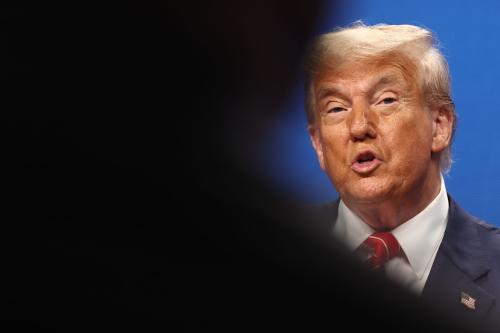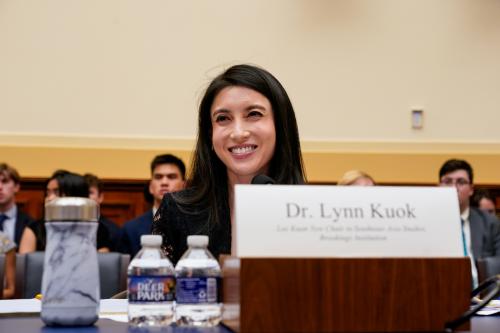Fumio Kishida was elected as Japan’s new prime minister after former Prime Minister Yoshihide Suga lost public support and political backing over his handling of the coronavirus and the Olympics. While Kishida’s early moves reflect a continuation of his predecessors’ economic and diplomatic principles, Mireya Solís says the general election at the end of October may give him stronger backing to put his own mark on policies from relations with China to income inequality.
Related material:
- Suga steps down: Japanese politics in the pandemic era
- The 2020 Tokyo Olympics were always meant to be a story of resilience
Listen to Brookings podcasts here, on Apple or Google podcasts or on Spotify, send email feedback to [email protected], and follow us at @policypodcasts on Twitter.
Thanks to audio producer Gaston Reboredo, Chris McKenna, Fred Dews, and Marie Wilken for their support.
TRANSCRIPT
PITA: On Monday, Japan’s parliament elected Fumio Kishida as the country’s new prime minister, replacing the outgoing Yoshihide Suga, who held office for only a year.
Today we’re talking with Mireya Solis, Philip Knight chair in Japan studies, senior fellow and director of Center for East Asia Policy Studies here at Brookings to get a better idea of what to expect from Prime Minister Kishida and the challenges ahead for Japan as it recovers from COVID. Mireya, thanks so much for talking to us today.
SOLÍS: Thank you very much; it’s a pleasure to be here.
PITA: So I think we’ll start with why the turnover of Prime Minister Yoshihide Suga after only a year? He came in with very high public support, so what went wrong with his administration?
SOLÍS: That’s an important question. You know, Prime Minister Suga was serving the remainder of the term of former Prime Minister Abe who resigned abruptly in August of 2020, so that means that Prime Minister Suga needed to win reelection as head of the party to stay on as prime minister.
So I think that Suga’s demise, the fact that he ended up being a prime minister just for a year, really, obeys two different factors. One is that he lost the confidence of the public, especially regarding the management of the pandemic. So what the Japanese public has been experiencing over the past year are different waves of the disease that were not really tamed by the state of emergency measures that were adopted. The rollout of the vaccine proceeded very slowly at the beginning; now actually dependence doing better than the United States, but it took a while to get there. And I think that there was a lot of frustration from the public, Adrianna, with the decision to go forward with the Olympics. They were very concerned that this could become a superspreader event and that the prime minister was not responsive to their concerns. So, I think that here, what happened was that the prime minister was not able to connect and reassure the public, and therefore lost the confidence of the voters.
But that was just one element of what transpired. He also lost the support of the political backers in the party, the party heavyweights, and that, of course, is very important because former Prime Minister Suga does not belong to a faction, so he needed this support in order to stay on. And we were witnessing some very dramatic moves, as he tried to stay on and he realized that actually he did not have strong support inside the party, that that had evaporated, and therefore, that nobody wanted to sign on to his ticket.
So what transpired, Adrianna, is basically that the party came to see him as a liability, and they dreaded the loss of seats in the general election that’s going to take place in the fall. And, therefore, that meant that he did not have the support of the public, he did not have support inside the party, and this changed very rapidly then, the nature of the presidential race in the LDP.
You know the script used to be the incumbent, Suga, and a challenge from Mr. Kishida, and when Suga threw his hat and said, “I’m not running,” then we actually had a very crowded field of candidates. Four people were running, two of them women. And it was actually Fumio Kishida who managed to come on top of that contest
So what does this tell us about Japanese politics? Well, this would be a very long conversation, but In short, I would say that it clearly shows that the establishment rules in Japan. Kishida is seen as a very moderate consensus-builder, but also establishment figure. The main contender he had was from someone that’s been seen as a maverick, more popular with the public – Taro Kono – but he was sidelined because he does not have a strong support within the party.
PITA: That’s good, you were getting a little bit into my next question, which was going to be, what do we know about Mr. Kishida? Especially, given the discontent that there was with Suga’s government, how much of a change agent, he was really expected to be, or is it he expected to just kind of continue the status quo, but with a new face? Can you tell us a little bit more about that?
SOLÍS: Of course, so you know. Mr. Kishida is a seasoned politician also comes from a political family. His base is in Hiroshima. He has had very important posts within the party, but also in the Cabinet. He was at some point policy chief of the Liberal Democratic Party, but also, he had a long tenure as foreign minister under Prime Minister Abe, five years.
So this means that he knows how Japanese politics tick and he’s also very well-versed on international relations and foreign affairs. Now in terms of his profile or outlook, there is consistent set of objectives that are used to describe Mr. Kishida: someone who is moderate or centrist, who is a consensus-builder, who’s pragmatic, but also dovish in foreign policy, and here, mostly in reference to China.
He has eyed the prime ministership for many years. He has tried in the past, but people used to think that he was not forceful enough and that’s what has prevented him from actually cinching the position. But what’s interesting to see, Adrianna, is that this time, things were very different. He really put everything on the line. He grew sharp elbows, so to speak; so he was the first to challenge the incumbent Prime Minister Suga. He actually drew a wedge between Prime Minister Suga and his supporters, one very important supporter in the party. That marked the beginning of the end for Prime Minister Suga. Kishida-san began to articulate more hawkish views on China that clearly reflect the trend within the party that has become more skeptical of China, has become more willing to vocally articulate those concerns.
So, that subdued Kishida of the past was not to be seen this time around, and there’s a lot of expectations now about what he will do as prime minister.
PITA: As you mentioned, Japan has reached a better place in terms of its vaccination and the public health condition under COVID. The emergency order that had been in place was lifted by Prime Minister Suga at the end of his time in office. What are going to be Mr. Kishida’s first, most urgent orders of business, as he comes into office?
SOLÍS: Well, the first one: elections. He already in his first press conference already announced that there’s going to be an election at the end of the month, so that’s going to concentrate all efforts. Then there is the discussion that he may actually very quickly become very active in diplomacy, that he might attend in person the G20 leaders’ summit in Rome. And another very important immediate priority, it seems that there are plans to put together a very large stimulus package. So those are just things out the gate that I think will preoccupy his administration.
But I think that the larger question, Adrianna, is something that you asked me about and I didn’t fully articulate before, is what are his long term priorities, what is his vision, how much change is coming to Japan or not. And those are, of course, very important questions.
Every leader tries to have an imprint, telegraphs certain landmark policies that are going to define his or her time, and I think we are already hearing some from Kishida-san. He’s talking about, in the domestic realm, the phrase is used is “a new capitalism.” And then in foreign affairs, I think there’s going to be a much more concentrated effort on economic security. So let me just say a word on each of these.
So, in essence, Kishida-san is highlighting the challenges of the gap society in Japan. He’s talking about a virtuous circle between growth and distribution; he’s talking about raising living standards by a bringing about wage increases. As much as he tries to portray these as departures and something that would set him aside from what other prime ministers have done, this is actually more doubling down on things that, for example, Prime Minister Abe was already doing. Especially the question of raising wages is something that he tried to bring to the titans of the business community, did not have a lot of success, so the question is can Kishida do something different, and can he really get to the causes of rising income inequality in Japan?
And then the other interesting policy that where there’s going to be a lot of effort is this economic security track. The idea here is that there’s concern about the risks of over-dependence with China, the risk of economic independence with far more assertive China, and the attempt is to protect critical infrastructure, critical technology, with a number of defensive measures. And what is new here is, these are already started in the Abe and Suga administrations, but what is new is that Kishida-san is creating a cabinet position. He has now named an economic minister and, therefore, we expect to see a whole-of-government national strategy on this front. And this does begin to mark more of a skeptical view towards China and tries to hedge the risks of that very strong dependence that Japan has on the Chinese market.
PITA: And also just continuing the longer term, what does his administration and his views, particularly the adaptation of his views on China that you described, what will that mean for Japan’s relationship with the U.S. and the Quad and the other sort of regional relationships there?
SOLÍS: Well, I think that there’s going to be a lot of continuity on these central tenets of Japanese foreign policy. And even in terms of personnel, Prime Minister Kishida decided to retain the minister of foreign affairs and the minister of defense. They’re seeing on so that already tells you that there’s a lot of continuity in terms of who’s handling this important portfolios.
And Japan very strongly continues to champion the free and open Indo-Pacific and the Quad. Actually Japan, I think, has felt that these have been win-win propositions, that it has made Japan have a lot of influence in how other countries are now articulating their views, about how they should draft their strategy towards the region, so I don’t expect to see in those central tenets of Japanese foreign policy a lot of change.
This does not mean that it’s not going to be challenging to actually operationalize this. And I think that the balancing act is already present; so Prime Minister Kishida is talking about economic security, is talking about concerns about China’s assertive behavior, but on the other hand, is talking about dialogue with China and is mindful of the economic ties that are still very important for Japan. So, how will they handle relations with China remains a central concern.
I think we need to see how much Kishida-san becomes his own person. There’s a lot of discussion as to continuity from central policies, from former Prime Minister Abe. Many of the people that he has tapped on to serve in the party and in the cabinet are strong allies of the Prime Minister Abe. So, will he find more space from Abe, and where will his legacy be? But I think this is a moot point until we know whether he can actually succeed where former Prime Minister Suga could not, and that is to have longevity and to go beyond the one-year mark. I think that there are better chances, I think their outlook is better for Kishida-san in this respect for two reasons. One is that the COVID situation is stabilizing; the state of emergency has lifted. But again with a virus, a curveball can come anytime, but if this becomes the reality, and with more people vaccinated it it’s easier to handle the virus, that will make a difference. But also because he’s having a very early general election. That means that if he does, really, really well and the party maintains the majority in alliance with Komeito, that means that he will have more space to deliver on his policies and find what are really going to be his defining policies going forward.
PITA: All right, great thanks so much for talking to us today.
SOLÍS: My pleasure, thank you.
The Brookings Institution is committed to quality, independence, and impact.
We are supported by a diverse array of funders. In line with our values and policies, each Brookings publication represents the sole views of its author(s).







Commentary
PodcastWill new Prime Minister Fumio Kishida bring change to Japan?
October 4, 2021
Listen on
The Current Podcast